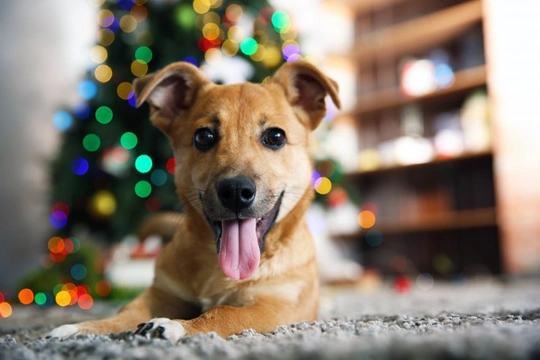
Some of the more unusual Christmas hazards that dog owners should be aware of
When it gets to December and the run up to Christmas, many dog owners like to get their dogs involved in the whole excitement of the festive season, and the socialisation, visiting, events and opportunities to scavenge for treats that this involves!
Most dog owners are aware that some of the decorations, foodstuffs and plants that we often enjoy at Christmas can be dangerous for dogs or at the least, not suitable for them-and this is a good starting point to make sure that your dog gets through the festive season safely.
However, as well as the most well-known hazards of the season such as mistletoe, chocolate and alcohol, there are also a reasonably large number of other, more obscure hazards that often make their way into our homes during the Christmas period too. In this article, we will look at some of the more unusual hazards that can pose a threat to your dog at Christmas, in order to ensure that you avoid them and keep your dog safe! Read on to learn more.
Batteries
If you have children (and even if you don’t) there is a reasonable chance that some of the gifts you may be giving or receiving will require batteries, and batteries can pose a hazard to the inquisitive dog. Not only are they the perfect size to be swallowed whole if your dog is apt to take off with a stray one, if your dog chews them, they may get acid burns to their mouth or internally if they are then swallowed.
Keep batteries in their packets and keep track of where they are-don’t leave them lying around!
Conkers
While conkers are something that we usually associate with autumn, some people use conkers as decorations at Christmas time too, for the tree or as part of wreaths. Conkers are just the right size and shape to appeal to a dog that likes to investigate and chew things, much like batteries are! Conkers can get stuck in your dog’s throat and lead to choking, and they are also toxic if ingested, so make sure your dog doesn’t get their paws on any!
Glow sticks
Glow sticks have an undeniable appeal to children and adults alike during party season, and these often come in different shapes and sizes designed to be bent into position as jewellery. The solution within the glow sticks that makes them glow is not as severely toxic as some substances, but it is still best avoided, as it contains an acidic compound that can lead to irritation and potentially, sores if your dog chews it.
Artificial sweeteners
Sugar substitutes like xylitol and other artificial products can be found in a wide range of different products, from sugar-free chewing gum to sweets for diabetic people and as a powder to add to drinks.
If any of your gifts or tree ornaments are food-based, check the packaging to see if they contain xylitol and keep them well away from your dog! The sweet taste may be appealing to your pet, and if ingested, can make them acutely ill.
Mince pies and Christmas pudding
One factor that many of the sweet foods we enjoy at Christmas have in common is that they often contain a lot of fruit, most notably sultanas and raisins, which are toxic to dogs. While most dog owners are aware of this, it is all too easy to overlook just how many foods contain these things, particularly if they are mixed in to things like mice pies and puddings where you cannot really tell the individual ingredients apart!
Don’t give your dog a taste of your pie or pudding unless you are sure about what is in it, and beware of all of the odd places that sultanas and raisins are apt to appear at Christmas!
Turkey bones
Cooked bones can be dangerous to dogs and cats alike, because the cooking process makes them apt to splintering, which can cause internal injuries in dogs that eat them. However, given the size of the average chicken carcass, there are usually plenty of turkey bones around at Christmas, and these fine, sharp bones should never be given to your dog.
If you want to offer your dog a special Christmas dinner, cut them off a couple of fine slices of the turkey but don’t give them drumsticks or other bones, and dispose of the carcass carefully. The smell of a turkey carcass in the bin for a day or so is often enough to make even the most well-behaved of dogs consider rooting around to find it!
Macadamia nuts
Finally, many dog owners are not aware that macadamia nuts are poisonous to dogs, and can lead to a range of fairly serious symptoms such as tremors and vomiting within a few hours of ingestion. Don’t leave trays and bowls of nuts around on low tables if your dog is apt to help themselves!



